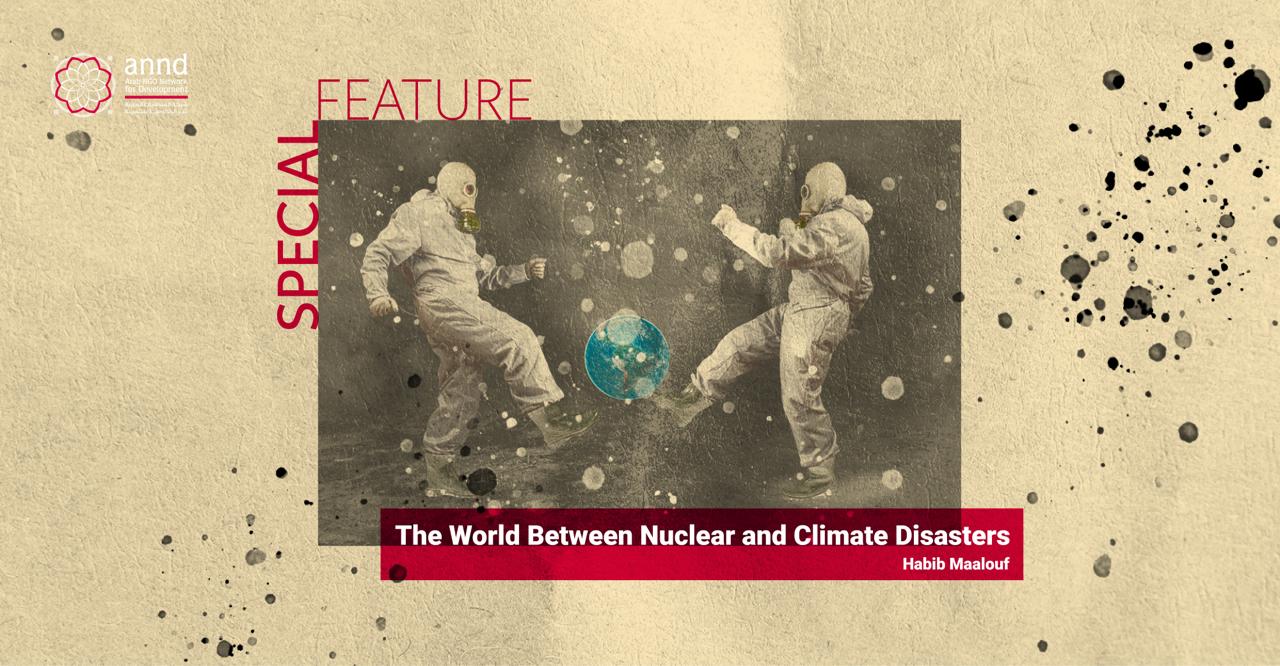

The World Between Nuclear and Climate Disasters - Habib Maalouf
Are the risks of nuclear war and its catastrophic consequences becoming comparable to those of climate change disasters? Which ideology has made nuclear science and nuclear energy a weapon and an existential threat, also competing with the issue of climate change?
The developments of the recent war between Israel and Iran, and the events between them and beyond, have imposed these questions and this type of existential challenge. This war's backdrop, both declared and implicit, raises more fears that existential competition between states would transform into "nuclear states" in every sense of the word, as well as the risks involved. The risks are beginning to rival all the inevitably expected climate threats, from an unprecedented rise in temperatures to increased flooding and drought, in a region already suffering from water scarcity and deadly temperatures.
Nuclear and climate disasters are both man-made, unlike natural phenomena like volcanoes, earthquakes, and tremors. However, the capacity to deal with these disasters is different. While climate disasters can be somewhat adapted to, especially extreme weather events such as floods, there are no options for adapting to a nuclear war, as the so-called "nuclear winter" could wipe out all of humanity. While research into climate change adaptation measures has required more than a quarter century of international discussions and conferences, with nuclear disasters, there is no way to take action within minutes in the event of war and the use of nuclear weapons, or within days of an accidental leak.
As an existential threat, the nuclear end is immeasurably faster, and there is no comparison between slow climate death and rapid nuclear death. Moreover, the nuclear issue is limited to the will of nine nuclear-armed states. In contrast, the climate issue requires international consensus, which has never been achieved except by signing non-binding and non-saving agreements.
Paradoxically, nuclear energy is the only competitor to fossil fuels for saving the climate if the world continues with its current (unjust) civilizational model of voracious and escalating energy consumption. Thus far, the planet has been placed between a dangerous choice and an even more dangerous one. The history of energy is not a history of energy transition, as some believe today, but rather a history of accumulation that follows the path of investment until exhaustion, moving from depleted to dangerous fuels to scarce fuels. Each new source increases demand until it ends and ends what comes after, until the end of everything.
The future of the climate and nuclear energy now hinges on the relationship between the three countries with the greatest possession, interest, and capability of atomic weapons: the United States, Russia, and China. There is an additional bet on the current US president, Donald Trump, whose term is considered the most connected and engaged with the other two countries, to establish rules to avoid a major nuclear war. None of the three countries currently finds itself in existential danger, and they are more likely to share global gains than consider destroying them. Meanwhile, reaching an agreement on climate rescue seems more difficult, due to the radical changes required to the dominant market economic ideology, and because of the US president's insistence on denial until the largest share of rare earths and minerals from which new technology is made is seized.
Because of the above and many other historical and psychological reasons, we can expect more deaths from relatively slow-onset climate disasters than from nuclear disasters. Nuclear weapons, whose manufacture has not yet evolved in the global race to be used (after the 1945 test when the United States struck Japan with a nuclear weapon). Despite threats and the world's likelihood of re-using them, even by accident, China continues to adopt a "no first use" policy, as much as it contributes to the arms race.
Hence, climate threats can be considered more urgent than nuclear threats, despite everything happening now. It is especially true if we recognize that this nuclear arms race is destructive, whether intentional or spontaneous, and is therefore more of a deterrent than a weapon. It is worth noting that the world's spending on armaments, in all their forms, is the most significant factor in delaying development and combating poverty, disease, and hunger worldwide. It also contributes to the ongoing decline in global funding for combating pandemics and climate change.
Why have we arrived here, and which ideology is responsible for this end?
It is the ideology of historical inferiority complexes, the desire for superiority, and the survival of the fittest. It is the ideology of compensation and fear. It is the ideology of megalomania. It is the ideology of the founding myths of differentiation, racism, and racial purity. It is the ideology of the ultimate superior (the purest, the best, the most, the greatest, the most honorable, the strongest, etc.).
As the product of inferiority complexes, it can only be confronted through global counter-campaigns, embracing opposing values, based on cooperation instead of competition, humility instead of claims of superiority, and replacing crowding, rivalry, and envy with empathy, compassion, and tolerance. Abandon the illusion of centralizing rationality and re-rationalize it. Rehabilitate the notion of science for science's sake. Stop the ideologization of technology as a tool of control, and reuse and develop technology as a tool to foster brotherhood between people and with nature. Reject the reductionist view and re-evaluate the holistic perspective. Adopt a circular perspective instead of a linear one. Halt depleting investments and guarantee the rights of future generations to materials and resources. Promote peace, non-violence, and the pursuit of spiritual fulfillment instead of the quest for control, possession, and consumption. Shift from deification and self-affirmation to the search for integration with others, with whom we share a common life, existence, and destiny.
Recent publications

